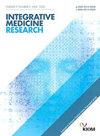一项关于如何提高中医与人工智能结合的全国性调查:医务人员的态度和看法
IF 3
4区 医学
Q2 INTEGRATIVE & COMPLEMENTARY MEDICINE
引用次数: 0
摘要
随着近年来人工智能(AI)的显著发展,中医药的传承与创新迫切需要AI技术的帮助。本研究旨在评估医务人员对中医与人工智能结合发展的态度和看法。方法对全国13家医疗机构进行横断面调查。本文于2025年6月27日至7月11日对1100名医务人员进行问卷调查,问卷分为6个部分,共14个项目。结果在临床实践过程中,62.1%的医护人员愿意尝试人工智能结合中医诊疗服务。中医与人工智能融合的前三大重要过程是医学研究、个性化方案生成和智能问诊。中医与人工智能结合的三大潜在风险是对文化背景的误解、辨证治疗的灵活性以及算法对传统中医经验的简化。最具应用前景的前三名分别是智能辨证系统(54.6%)、中医四诊仪(49.1%)和针灸推拿机器人(47.8%)。人工智能在中医中应用的前三个最重要的因素是准确性(78.0%)、操作便利性(67.5%)和医务人员的参与(60.9%)。结论中医与人工智能的融合具有光明的前景,可以优先考虑诊断准确性,同时解决关键应用(如辨证系统)的文化/临床适应性挑战。本文章由计算机程序翻译,如有差异,请以英文原文为准。
A national survey on how to improve the integration of traditional Chinese medicine and artificial intelligence: Attitudes and perceptions from medical staff
Background
With the significant development of artificial intelligence (AI) in recent years, the inheritance and innovation of traditional Chinese medicine (TCM) urgently require the help of AI technology. The present study was to evaluate the attitudes and perceptions of medical staff towards the integration of TCM and AI development.
Methods
A cross-sectional national survey was conducted at 13 medical institutions across China. A structured and self-reported questionnaire, consisting of six sections with a total of 14 items, was administered to 1100 medical staff between June 27th and July 11th, 2025.
Results
In the process of clinical practice, 62.1 % of medical staff were willing to try TCM diagnosis and treatment services combined with AI. The top three important processes of integration of TCM and AI were medical research, personalized generation of regimen, and intelligent inquiry. The top three concerns about the potential risks associated with the integration of TCM and AI were the misinterpretation of cultural contexts, flexibility in dialectical treatment, and simplification of traditional TCM experience by algorithms. The top three most promising applications were the intelligent syndrome differentiation system (54.6 %), the TCM four diagnostic instruments (49.1 %), and the acupuncture and Tui Na robot (47.8 %). The top three most important factors in the application of AI in TCM were accuracy (78.0 %), convenience of operation (67.5 %), and participation of medical staff (60.9 %).
Conclusion
The integration of TCM and AI has a brilliant and promising future, prioritizing diagnostic accuracy while addressing cultural/clinical adaptation challenges in key applications, such as syndrome differentiation systems.
求助全文
通过发布文献求助,成功后即可免费获取论文全文。
去求助
来源期刊

Integrative Medicine Research
Medicine-Complementary and Alternative Medicine
CiteScore
6.50
自引率
2.90%
发文量
65
审稿时长
12 weeks
期刊介绍:
Integrative Medicine Research (IMR) is a quarterly, peer-reviewed journal focused on scientific research for integrative medicine including traditional medicine (emphasis on acupuncture and herbal medicine), complementary and alternative medicine, and systems medicine. The journal includes papers on basic research, clinical research, methodology, theory, computational analysis and modelling, topical reviews, medical history, education and policy based on physiology, pathology, diagnosis and the systems approach in the field of integrative medicine.
 求助内容:
求助内容: 应助结果提醒方式:
应助结果提醒方式:


